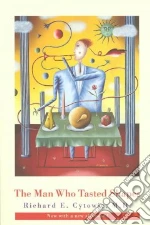 Libri di Cytowic Richard E. su Unilibro.it
)
Libri di Cytowic Richard E. su Unilibro.it
)
|
|
2025 |
 Title :
Un cervello dell'età della pietra nell'era degli schermi. Affrontare distrazione e ansia senza farsi travolgere
Title :
Un cervello dell'età della pietra nell'era degli schermi. Affrontare distrazione e ansia senza farsi travolgereAuthor: Cytowic Richard E. Publisher: Apogeo Il nostro cervello non è molto diverso da quello degli antenati dell'età della pietra. Ecco perché, secondo il pluripremiato neurologo Richard Cytowic, è così poco attrezzato per resistere alle incursioni delle Big Tech: a livello fisiologico il cervello umano è ancora programmato per le esigenze molto diverse di un mondo preistorico. La funzione della dopamina negli istinti fondamentali di sopravvivenza, il ruolo delle emozioni nella competizione e, soprattutto, il riflesso di orientamento, uno dei circuiti inconsci che focalizza l'attenzione, sono alla base del funzionamento del cervello, oggi come allora, e sono i responsabili delle nostre dipendenze da smartphone. Con lo stile coinvolgente dei suoi popolari TED Talk, l'autore illustra come funziona la programmazione cerebrale, rivela perché siamo dipendenti dagli schermi e perché i cervelli giovani e in via di sviluppo sono particolarmente vulnerabili; infine, spiega perché abbiamo bisogno di silenzio e cosa possiamo fare per opporci. Conoscere questi meccanismi è il primo passo per cambiare il modo in cui usiamo la tecnologia, resistere al suo potere di assuefazione e riprendere il controllo che abbiamo perso sul nostro tempo. "Richard E. Cytowic ha cambiato il modo di pensare al cervello umano." Oliver Sacks, autore di L'uomo che scambiò sua moglie per un cappello € 24,00
Scontato: € 22,80
|
|
|
1918 |
 Title :
Synesthesia
Title :
SynesthesiaAuthor: Cytowic Richard E. Publisher: Mit Pr € 14,30
|
|
|
1911 |
 Title :
Wednesday is Indigo Blue
Title :
Wednesday is Indigo BlueAuthor: Cytowic Richard E. M.D., Eagleman David M. Ph.D., Nabokov Dimitri (AFT) Publisher: Mit Pr A person with synesthesia might feel the flavor of food on her fingertips, sense the letter "J" as shimmering magenta or the number "5" as emerald green, hear and taste her husband's voice as buttery golden brown. Synesthetes rarely talk about their peculiar sensory gift--believing either that everyone else senses the world exactly as they do, or that no one else does. Yet synesthesia occurs in one in twenty people, and is even more common among artists. One famous synesthete was novelist Vladimir Nabokov, who insisted as a toddler that the colors on his wooden alphabet blocks were "all wrong." His mother understood exactly what he meant because she, too, had synesthesia. Nabokov's son Dmitri, who recounts this tale in the afterword to this book, is also a synesthete--further illustrating how synesthesia runs in families. In Wednesday Is Indigo Blue, pioneering researcher Richard Cytowic and distinguished neuroscientist David Eagleman explain the neuroscience and genetics behind synesthesia's multisensory experiences. Because synesthesia contradicted existing theory, Cytowic spent twenty years persuading colleagues that it was a real--and important--brain phenomenon rather than a mere curiosity. Today scientists in fifteen countries are exploring synesthesia and how it is changing the traditional view of how the brain works. Cytowic and Eagleman argue that perception is already multisensory, though for most of us its multiple dimensions exist beyond the reach of consciousness. Reality, they point out, is more subjective than most people realize. No mere curiosity, synesthesia is a window on the mind and brain, highlighting the amazing differences in the way people see the world. € 26,80
|
|
|
2003 |
 Title :
The Man Who Tasted Shapes
Title :
The Man Who Tasted ShapesAuthor: Cytowic Richard E., Cole Jonathan (FRW) Publisher: Bradford Books Richard Cytowic's dinner host apologized, "There aren't enough points on the chicken!" He felt flavor also as a physical shape in his hands, and the chicken had come out "too round." This offbeat comment in 1980 launched Cytowic's exploration into the oddity called synesthesia. He is one of the few world authorities on the subject.Sharing a root with anesthesia ("no sensation"), synesthesia means "joined sensation," whereby a voice, for example, is not only heard but also seen, felt, or tasted. The trait is involuntary, hereditary, and fairly common. It stayed a scientific mystery for two centuries until Cytowic's original experiments led to a neurological explanation--and to a new concept of brain organization that accentuates emotion over reason.That chicken dinner two decades ago led Cytowic to explore a deeper reality that, he argues, exists in everyone but is often just below the surface of awareness (which is why finding meaning in our lives can be elusive). In this medical detective adventure, Cytowic shows how synesthesia, far from being a mere curiosity, illuminates a wide swath of mental life and leads to a new view of what is means to be human--a view that turns upside down conventional ideas about reason, emotional knowledge, and self-understanding.This 2003 edition features a new afterword. € 26,80
|